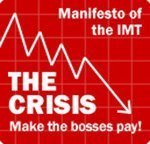 As our editorial last month pointed out (See: Now for the economic fall out),
As our editorial last month pointed out (See: Now for the economic fall out),
what killed the citizens of Pompeii was not the pyrotechnics of the explosion
of Mount Vesuvius, but the resulting ash that choked the people. It is
possible, though not inevitable, that we have seen the worst of the banking
collapse. But the results are destroying jobs all over Britain.
As Tony Jackson pointed out (Financial
Times 20.10.08) the Baltic Dry Index, which measures bulk shipping rates, is
down 90% from its may peak. He goes on, “The main reason, apparently, it that
shippers cannot get trade credit,” from the banks. “The system of export credits applies to iron as
it does to coffee. Take it away and trade is crippled.”
Just in time
In recent years capitalism has developed
‘just in time’ supply of inputs. Big industrial customers are leaning on small
suppliers by delaying payment. That threatens to hole them under the water. The
small businesses need credit insurance and that is getting more expensive and
harder to get. All these transactions are linked up with money. Money is
supposed to come from the banks. And they’re not delivering. The whole
‘infrastructure of trade’ is seizing up.
CBI
Discussing the CBI prediction of the
deepest downturn since 1991 at least, the FT’s Norma Cohen takes up the story
(17.11.08). The banking collapse and, “The subsequent withdrawal of credit from
businesses and households has shattered the confidence of CBI members, forcing
them to postpone decisions on new projects.” So investment is next out of the
window. On the same day John Willman told of the effects on carmaking and
retailing. “When the banking system threatened to plunge into meltdown in
September, sales went off a cliff.”
Indeed. Woolworths, which makes 90% of its
profits in the 6 weeks before Christmas, has put its 800 stores up for sale at just
£1. 30,000 jobs are at risk. Marks & Spencer is holding sales before Christmas. Retailing looks like
a disaster – which means that, for millions, Christmas has already been
cancelled. Most car plants in Britain are on short time working, have shifts
cancelled, or are ‘on holiday’ for a long Xmas break.
 Capital Economics
Capital Economics
Capital Economics says the story so far is
“compatible with output falling by around 10% per annum.” The FT, an
irrepressible commentator on our woes, spots a difference, ‘Grim down south’
runs the headline. They predict 60,000 finance posts to go in London next year
and 370,000 jobs in total (1 in 12) over the next few years. So misery is to be
democratically spread around the country, not just inflicted on northern
industrial cities.
JCB
What’s to be done? Workers at JCB agreed to
pay cuts in the form of loss of shift allowances and Christmas bonus and a
four-day week, dropping £50 a week in the process, to help the firm out of its
difficulties and save jobs. Three weeks after the deal, which involved 180 job
losses, management were back to make the extra redundancies. 398 more jobs are
to go. The lesson is – you can’t satisfy the job-destroying juggernaut by
making concessions to management. The fight for jobs is a fight against the
system that slashes them.
Avalanche of job losses
Many workers go the extra mile for the
festive season. Even if the future is insecure, especially if the future is
insecure, they will max themselves right up to the limit on their plastic to
lay on a good spread and lavish stuff on the kids. This time for many people
it’s different. The money’s just not there.
In the last few weeks we’ve seen an
avalanche of job losses. And 30,000 families so far this year have had their
homes repossessed. Millions more will be worried sick about the future. Christmas
and the end of the year is a time for taking stock. The New Year is a time for
making resolutions. Millions have already worked out who the bad guys are. In
the London performance of Dick Whittington the pantomime villain King Rat is a
banker. Don’t just boo and hiss these people, resolve to help us to get rid of
them and their rotten system. Recall
the TUC for an emergency action programme to fight unemployment
What to do?
- Recall the TUC for an emergency action programme to fight unemployment.
- No
redundancies. Work or full pay! - Nationalise
the commending heights of the economy under workers’ control and
management.
See also:







